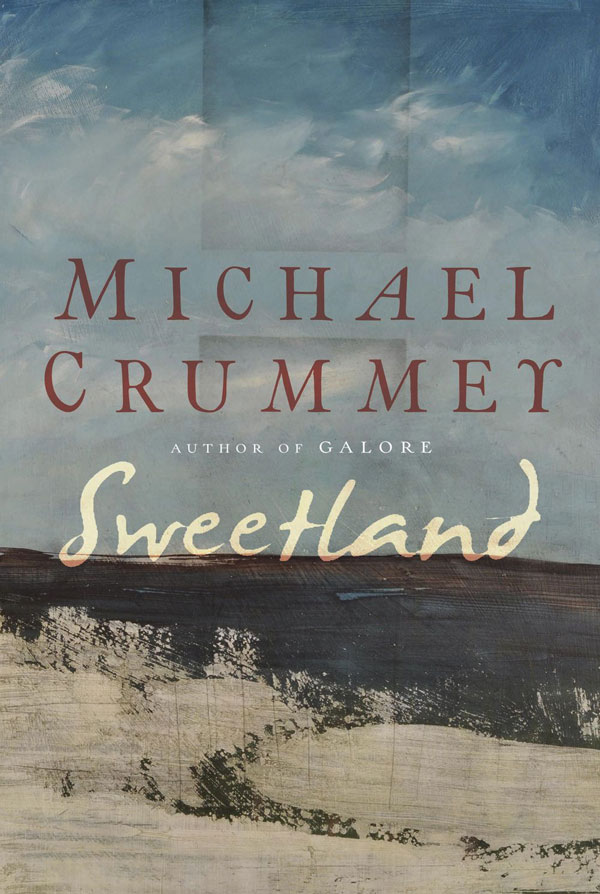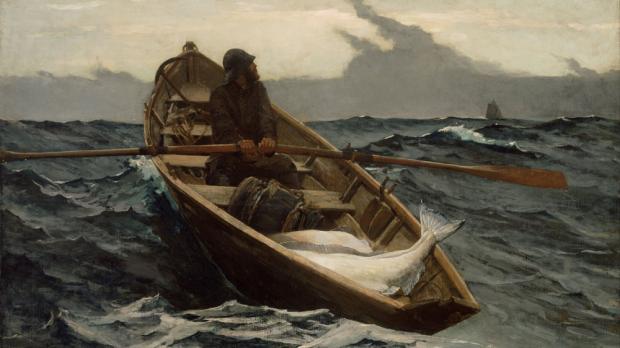The King of the World
 Sweetland
Sweetland
By Michael Crummey
Liveright, 2015
In one of the many eerie recollections in Sweetland, the fourth novel from Michael Crummey, Moses Sweetland helps wildlife officers transport two dozen bison onto the tiny island that bears his family’s name. The goal was to determine if there was any disease risk to the local wildlife, after which the animals would be moved onto the Newfoundland mainland. The episode is described deftly, with a unique kind of economy: “Staggering into the open with a stunned air about them, shaking those big rig shoulders and prancing drunkenly up away from the water.” The final bison cow “becomes unhinged” and shatters the box that had held each animal on the small boat. She falls into the water as Sweetland lunges to grab her tail.
“She went down slowly at first, submerging like a boat taking on water. But once she was under she sank like a stone, as though she was on a line and being dragged down from below. That dark face staring up at Sweetland on the surface, eyes wide, bubbles streaming from the massive nostrils. He could see her descending through the clear water for a long, long time.”
It is a stunning image, and I wondered how Crummey achieved feats of immediacy like this every time I turned the page. He paints each person, each animal, each gust of seasalt wind that ever touched Moses Sweetland’s eponymous island in vivid greys, greens, blues, and blacks with a confident hand. The result is a heart-rending novel of intimate beauty, a portrait of the life of a dying world and lives of the people who died in it.
Sweetland has fewer than 50 residents when we arrive, all of whose families have lived there for generations. They are almost completely isolated from the outside world except for several plausible modern pinpricks: the internet, for instance, which Moses uses to play online poker sometimes and which his nephew Jesse uses to watch Titanic over and over. The lighthouse, which Moses used to operate, has been automated. The island has a helipad that is rarely used. Someone mentions Osama bin Laden in the barbershop. These fingerprints of the contemporary dot the novel’s unique landscape, which is otherwise constantly besieged by the indomitable will of the elements.
Sweetland’s numbers have been steadily dwindling for decades, however. Most have gone in search of work to places like Fort McMurry in Alberta or Toronto. The Canadian government would like to be rid of the liability posed by the remaining stragglers and the cost of providing utilities to the island, so it makes them an offer: Each household will receive $100,000 if and only if every resident agrees to leave. Moses, who has spent almost his entire life on the island, and whose parents and grandparents did as well, refuses. He soon receives threatening letters and finds the rabbits caught in his snares mutilated grotesquely. The small cast of characters who could be behind these menacing gestures is made even smaller by the fact that Moses has known each of them his whole life. A dark, electric sense of paranoid foreboding descends upon the novel and Moses’s solitary life.
Death, too, is shadowing his every step. Jesse, who is a young autistic boy and the last of Sweetland’s blood, speaks constantly with Hollis, Moses’s brother who died well before Jesse was born. He carries on one-sided conversations with the thin air Hollis occupies in his mind. Despite the specter looming at the corners of Moses’s field of vision, he continues the hard labor of life on the island. Crummey has an interest in the clever work of existing on the frontier of the civilized world. He, like Hemingway, rejoices in the uncomplicated pleasure of being warm in bad weather or eating a good meal when you’re hungry. Like Cormac McCarthy, he writes the poetry of the patois, which he uses to great effect in both his characters’ speech and the omniscient narration. And like Faulkner, he has an abiding interest in life’s eldritch limbo, the space in which the leviathan tides of the world might unbury a coffin or introduce a young boy to a dead man. The novel’s second half, titled “The Keeper’s House,” bears the following epigraph, from Revelations: “And the sea gave up the dead which were in it…”
Moses stows away on Sweetland as all of the others depart and embarks on his life’s striking coda. In the silence after the community’s dissolution, the reader appreciates anew Moses’s monosyllabic wisdom, his realistic senses of right and wrong and duty and humor. He is 70 years old and alone in the middle of the Atlantic, a real old man and the sea. His beautiful struggle to stay alive is like a written interpretation of Winslow Homer’s The Fog Warning, a painting that depicts a lone man in a dory with his day’s catch of halibut. The seas are choppy and his face is turned to the sky, which is filling with an approaching fog bank that will leave him stranded in the roiling ocean.
The final third of the novel is a heart-breaking elegy to a way of life that will, like all things, die.
“There was the sway of things, Sweetland knew. There was fighting the sway of things or improvising some fashion of riding it out. And then there was the sway of things beyond fighting and improvisation. It was almost impossible to know the difference between one and the other, but he felt close to making a call on the line.”
I taught Faulkner’s “The Bear” to a high school English class once. As I reread it and discussed it with the students, the story did not collapse into its disparate parts under the gaze of analysis. Rather, it seemed to bloom into an unending proliferation of metaphor, each figure standing for himself and for the world, for history and life and growth and death. Sweetland does that. It breaks your heart in the process, and in the most beautiful way.

